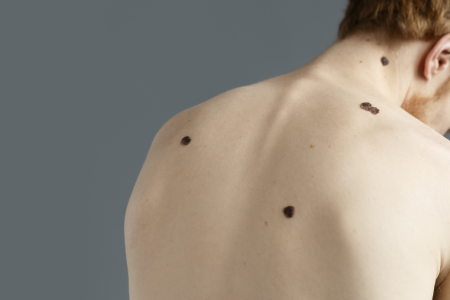signs and symptoms

The signs and symptoms of skin cancer can vary depending on the type, but some common symptoms include:
- A new mole or a mole that changes in size, shape, or color
- A sore that doesn’t heal
- A rough, scaly, or dry patch of skin
- A lump or bump that is red, pink, or pearly white
- A change in the size, shape, or color of a mole
- Musculoskeletal cancer signs and symptoms can include:
- Bone pain, swelling, or tenderness
- Loss of function in the affected limb
- A noticeable lump or bump in the area of bone or soft tissue
- Fatigue, weight loss and other general symptoms
Risk factors for skin cancer

Sun exposure: The most significant risk factor for skin cancer is exposure to the sun’s ultraviolet (UV) rays.
Fair skin: People with fair skin are at a higher risk of developing skin cancer.
Moles: People with many moles or large moles have a higher risk of developing melanoma.
Personal or family history of skin cancer: If you have had skin cancer in the past or if someone in your family has had it, your risk is higher.
Risk factors for musculoskeletal cancer include:
Exposure to radiation: Long-term exposure to radiation can increase the risk of bone and soft tissue cancers
Genetics : Genetic syndromes such as Li-Fraumeni, retinoblastoma, von Recklinghausen neurofibromatosis, and hereditary retinoblastoma, increase the risk of developing musculoskeletal cancer.
Exposure to certain chemicals, such as benzene, can also increase the risk
Age: Bone and soft tissue cancer is more common in children and young adults.
Prevention and screening for skin cancer include:

Protecting your skin from the sun: Using sunscreen, wearing protective clothing, and staying in the shade during peak sun hours can reduce your risk.
Avoiding tanning beds: Tanning beds and sunlamps emit UV rays that can increase the risk of skin cancer.
Monitoring your skin: Regularly checking your skin for new moles or changes in existing moles can help detect skin cancer early.
For musculoskeletal cancer, there is no specific screening test. However, if you have a family history of bone or soft tissue cancer











 +91 44 4200 4200
+91 44 4200 4200 
